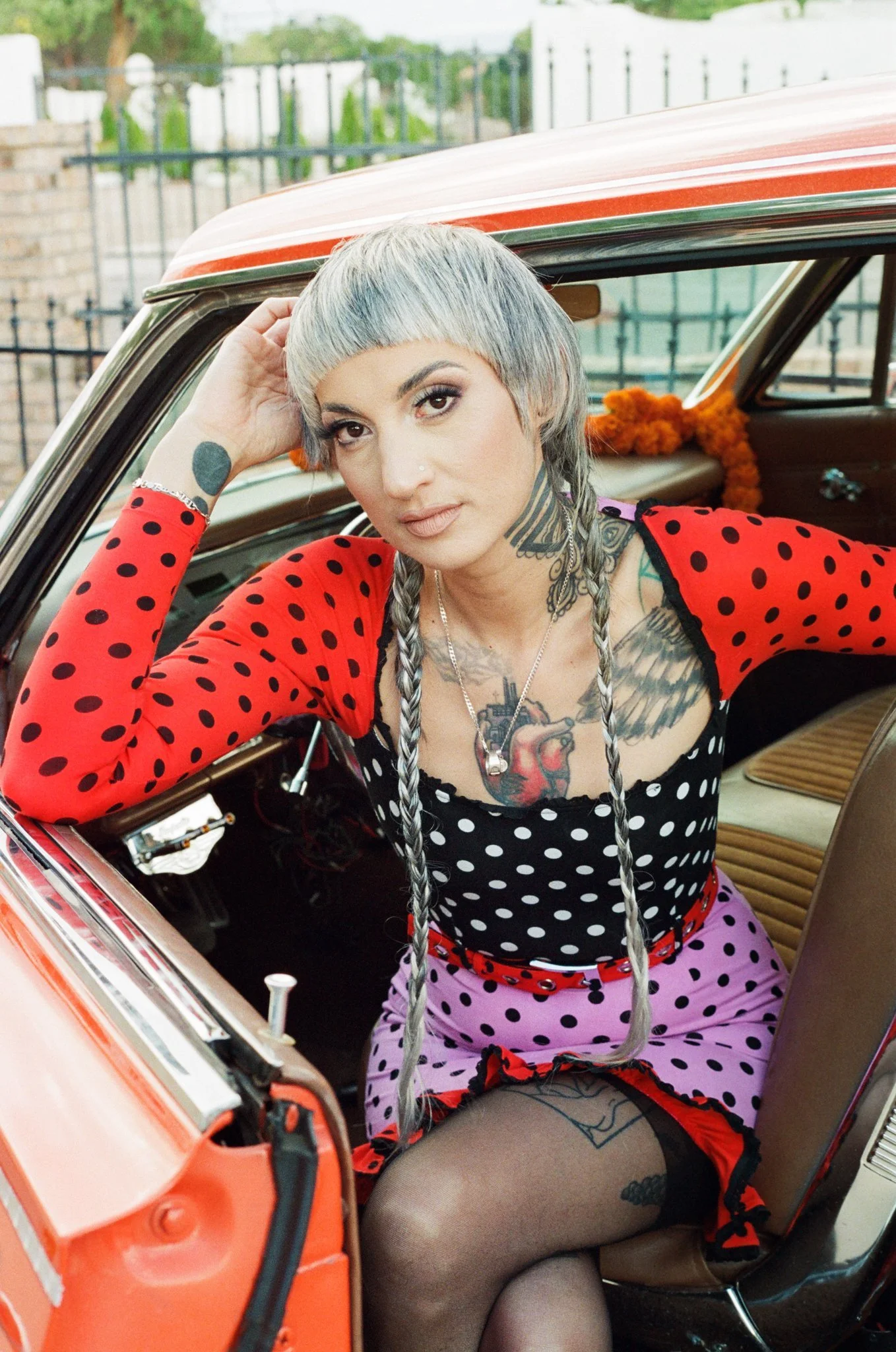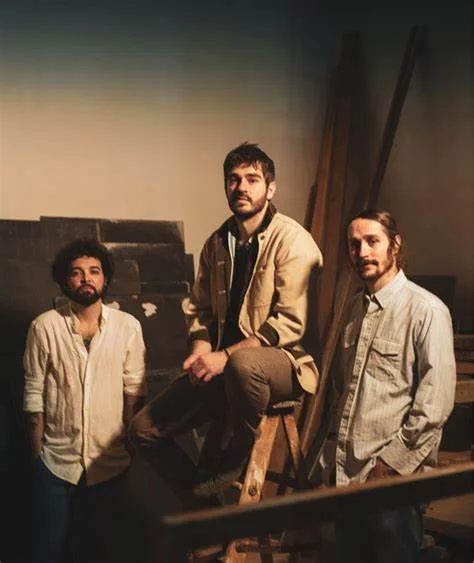MUSIC | SUNDAY, OCTOBER 20 | 7:30 PM | $25–30
Lensic 360 Presents Y La Bamba
Lensik 360 is bringing Y La Bamba and Kiltro to the FUSION | 708 stage on Sunday, October 20th, at 7:30 PM, as the final event in the Rising High Arts Festival!
TICKETS: $25-30
Doors will open at 6:30 PM and all ages are welcome!
FOR ONLINE CUSTOMER TICKETING sales and support contact support@holdmyticket.com or call 1-877-466-3404.
IN-PERSON WALK-UP SALES ONLY for all shows are available at the Lensic Box Office during Box Office hours.
ABOUT Y LA BAMBA
To declare one thematic narrative from Lucha, Y La Bamba’s seventh album, would be to chisel away a story within a story within a story into the illusion of something singular.
“Lucha is a symbol of how hard it is for me to tackle healing, live life, and be present,” Luz Elena Mendoza Ramos, lead vocalist and producer of Y La Bamba, says of the title behind the album which translates from Spanish to English as ‘fight’ and is also a nickname for Luz, which means light. The album explores multiplicity—love, queerness, Mexican American and Chicanx identity, family, intimacy, yearning, loneliness—and chronicles a period of struggle and growth for Mendoza Ramos as a person and artist.
Lucha was born out of isolation at the advent of COVID-19 lockdowns, beginning with a cover of Hank Williams’ “I’m So Lonesome I Could Cry,” and following Mendoza Ramos as she moved from Portland, Oregon to Mexico City, returning to her parents’ home country while revisiting a lineage marred by violence and silence, and simultaneously reaching towards deeper relationships with loved ones and herself. The album reflects “another tier of facing vulnerability,” as Mendoza Ramos explains, and is a battle cry to fight in order to be seen and to be accepted, if not celebrated, in every form—anger and compassion, externally and internally, individually and societally. As much as la lucha is about inner work, fighting is borne from survival stemming from social structures designed to uplift dominant groups at the hands of suffering amongst the marginalized.
While peeling back layers of the past to better understand the present has been integral to this period of growth for Mendoza Ramos, time, trauma, and history can feel like interconnected, abysmal loops and music has remained a trusted space for Mendoza Ramos to process, experiment, and channel her learnings into a creative practice. In this way, Lucha has become cyclical, documenting the parallel trust Mendoza Ramos has built with herself to allow the songs to guide how they should be sung, or even sound.
“I’ve been wanting to let whatever feels natural—with rhythm and musical instruments like congas and singing—to just let it be, in the way that I’m trying to invoke in myself.” Lucha reflects on, “the continuing process of learning how to exercise my producing skills,” explains Mendoza Ramos. “I have so many words, ideas to work with all the time, and the hardest part for me has been learning to trust my gut. And figuring out how I work best, and with who.”
The result is a collection as sonically sprawling and bold as its subject matter. On “La Lluvia de Guadalajara,” Y La Bamba leans into a minimal, avant-garde soundscape as Mendoza Ramos recites a spoken word poem. Later, rhythms veer into bossa nova territory on “Hues ft. Devendra Banhart,” a full-circle collaboration for Mendoza Ramos as she reminisces on the significance of finding Banhart’s work nearly two decades earlier: “He was the first young Spanish-speaking musician that wasn’t playing traditional Mexican music I heard when I was 21. There was nothing like it around that time.”
“Nunca” is a warm, wind-rich track dedicated to her mother, Maria Elena Ramos whose poetry is published alongside the Lucha lyrics booklet. “I decided to put my mom’s poem, which is a poem that she wrote to me, letting me know how she felt, exploring her heart in new ways she’s never imagined. Sharing it on the record is me paying attention that she’s expressing herself.
While each song holds personal significance to Mendoza Ramos, part of growing into her identity as an artist has been allowing space for protection and boundaries, and choosing to withhold some of that meaning from the public. Lucha is her own story of the complexity of trauma and nonlinear healing and growth processes, but she imagines it is also the continuation of her ancestors’ stories and might also be a mirror to the story of others. “Even though I’m trying to fight, I never want to demonize suffering, because that’s part of growing. And it’s hard, because we’re living in times where that [stigma] is what’s happening. So if this—me talking about my mental health and finding healing in my queerness—is a risk, I hope that I find a community that protects it and protects me, because they know I have their back. I am also trying to be my mom’s community.”
ABOUT KILTRO
Years ago, Chilean-American singer/songwriter Chris Bowers Castillo moved to the port city of Valparaíso and became a walking tour guide.
“I would dress up as Wally and give tours to families and kids,” he remembers with a laugh. “It was great, because I got to know the city incredibly well. I’d walk for hours, then spend the rest of the day partying and drinking, probably way too much. But I also wrote lots of new songs.”
Back in Denver, Chris looked for a moniker that reflected the evocative and subtly rebellious musical concepts percolating in his head, and settled on kiltro – a word used in Chile for stray dogs or mutts. He then teamed up with bassist Will Parkhill and drummer Michael Devincenzi, later inviting Fez García to join the band as an additional percussionist on Kiltro’s live gigs.
“I wanted to do a project mixing different styles and aesthetics,” he says. “Valparaíso is my favorite city in the world and will always influence my music. There were street dogs everywhere, and I’m a mutt myself.”
Titled Underbelly, Kiltro’s sophomore album crystallizes those dreams and experiences into a post-rock manifesto of dazzling beauty. Its songs combine touches of shoegaze, ambient and neo-psychedelia with the soulful transcendence of South American folk – the purity of stringed instruments, supple syncopated percussion and elusive melodies that define the works of Latin American legends such as Violeta Parra, Víctor Jara and Atahualpa Yupanqui.
From the propulsive, chant-like groove of “Guanaco” to the art-pop panache of “All the Time in the World,” Underbelly is the kind of record that invites you to quiet down and listen, savoring every single detail. The album reaches an emotional pinnacle during its second half, when the majestic lament of “Softy” – seeped in exquisite cushions of reverb – segues into the hypnotic reverie of “Kerosene.”
It also signals a new chapter in the fusion of Latin roots with mainstream rock, anchoring its sonic quest on a rare commodity: inspired songwriting.
“So much of this album is defined by the conditions that made it,” says Chris. “Our debut – 2019’s Creatures of Habit – has a social, almost communal feel to it, because we played it live time after time before recording. In a way, the songs were troubleshooted in the presence of an audience, then honed in the studio. Underbelly, on the other hand, was made in quarantine. It was just us obsessing in the studio, and we ended up following whatever thread seemed most interesting at the time, which made for an album that is more experimental and creative.”
“We’re trying to make sense of the process as we experience it,” adds Will, who returned to Denver and became part of Kiltro after a few years living abroad. “The way we make music, we’re definitely not interested in dropping singles. Something that Chris and I have in common is our interest in capturing ambient textures that evoke a sense of place. When we first played music together – years before Kiltro – we got microphones and tried to record the sound of water running down a bathtub. It didn’t work out then, but we revisited the same concept on this album.”
Quarantine isolation allowed Kiltro to obsess over every single loop and melodic turn. Now that the band is ready to tour again, presenting the songs in a live setting poses a beautiful challenge.
“We were mixing the album when the question came up: how the hell are we going to do this live?,” says Chris. “Live shows are a real important component of what we do – in a way, it’s the very reason of why we make music. There will be four of us onstage, and I do a lot of live looping. We have two drummers, which helps a lot when you consider the percussive element of this album. I’ve learned that we don’t have to favor a maximalist approach. People connect with melody and the concept. As long as the harmonic elements carry the emotional message across, you can take the songs into many possible directions.”
For now, the release of Underbelly marks a bold step forward in Kiltro’s extraordinary musical journey.
“When we first started the band, I was playing folk songs – focusing on my interior spaces and finding catharsis through melody,” says Chris. “I’ve always been attracted to music that is melancholy and personal. Then we added the rhythmic component, and I realized that having a bit of noise and chaos can add emotional depth. Underbelly reflects everything that happens inside your soul when the world stops on its tracks.”
“We tried a lot of new things on this record,” agrees Will. “We were living through unprecedented times and coming to terms with all of it. The album is a reflection of that. At the end of the day, we wanted to create the kind of music that we didn’t hear anywhere else.”
Quality bar service provided by Safe House Distilling Co. and Teller Genuine Vodka.





